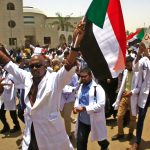I spend a lot of my time talking with other doctors. Most of the conversations are in the Oakland, California emergency room where I work – asking a colleague their opinion, consulting a specialist, or admitting a patient to the wards. In the past several years, as a volunteer for Physicians for Human Rights, I’ve also spoken to doctors from Bangladesh, Haiti, Palestine, Syria, Türkiye – and, most recently, Sudan.
In all of these situations, I see a common thread: medical professionals who truly care for their community, who witness some of the worst moments in a person’s life and try to alleviate the pain. But especially when resources are limited and there are political or social crises, one thought keeps coming back to me: these doctors that I work with and talk to, they are the ones on the front lines, preserving their patients’ health – and just as often, they’re the last line of defense when governments and other actors threaten their patients’ lives.
In the past few months, the doctors of Sudan have illustrated this point well. In my conversations with them, they’ve explained what they see every day: patients from all walks of Sudanese society cut off from opportunities for greater success and better health. When people’s frustrations erupted into a wave of popular protests last December, the doctors saw protesters being abused, disappeared into secret facilities, and coming out with the stigmata of torture. These experiences, the doctors say, compelled them to not only demonstrate with their fellow citizens, but to organize and lead the protests themselves and bring international attention to their cause.
In the weeks since President al-Bashir was forced to step down, rather than resigning to military rule, doctors have stepped up calls for civilian governance and democratic participation. Sudanese doctors in the United States and around the world have reached out to the broader community, sending information to human rights organizations and making sure that Sudan’s revolutionary movement gets attention.
Doctors in Sudan have also been the last defense against government impunity for human rights violations. When security forces brought in prisoners they had tortured to death, they would demand that doctors sign false medical reports claiming the prisoners had instead died of natural causes. If doctors refused, they could be jailed or stripped of their jobs and medical licenses.
When governments deny abuses, doctors are among the few professionals with the legitimacy and expertise to publicly state otherwise. Indeed, forensic doctors across the world have been crucial in uncovering crimes, even decades after they were committed, and bringing perpetrators to justice.
I spoke to one physician in Sudan who said that she saw her work amongst the protesters as a fundamental part of her Hippocratic oath. “Of course I must go,” she said of the protests. “My job as a doctor is to protect innocent people and make their lives better. That does not stop at the clinic door.”
This attitude is certainly not unique to Sudan. In Syria, I talked to doctors and pharmacists risking their lives to care for patients while their hospitals were being bombed. In Bangladesh, I met with doctors, physician’s assistants, and nurses sweltering in difficult conditions to make sure that almost a million Rohingya refugees had some access to health care and that their injuries were documented.
All over the world, health care workers like these are persecuted and attacked for simply fulfilling their ethical and professional obligations to care for all people, regardless of their political, religious, or other affiliations. In Myanmar, medics, who were one of the few groups with the resolve and expertise to assist persecuted hill tribes, were chronically beaten, jailed, and looted. In Syria, PHR has documented over 553 aerial bombardments on health facilities and the killing of 890 health workers since the start of the conflict, the vast majority carried out by Syrian government forces and their allies. While these attacks on health are widespread, there has been little to no accountability for the perpetrators.
Assaults like these take a toll and certainly undermine health. But what I mostly see among my colleagues is resiliency and compassion. Last week, Sudan witnessed what was called the largest protest by the medical community in the country’s history. Thousands of doctors marched in their white coats against a military take-over. These demonstrations reminded me of “White Coat” protests from the U.S. Civil Rights movement to the White Coats for Black Lives marches more recently. At great risk, medical workers across the ages and around the world have both upheld their oath as healers and gone above and beyond to fight for justice on the streets. In many cases, they have paid a terrible price for their commitment. The international community must do far more to protect them, and to hold those who target them accountable.

